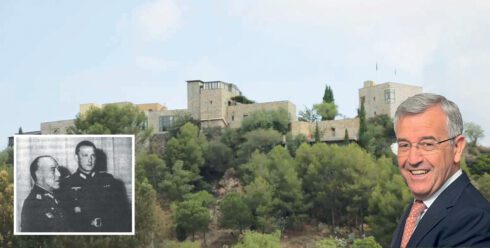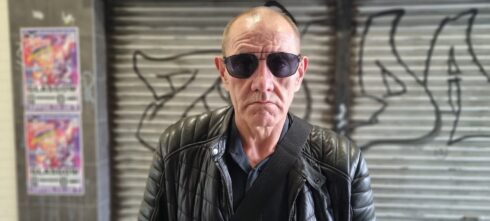THE United Kingdom’s shock decision to hand over sovereignty of the Chagos Islands to Mauritius has left many in Gibraltar and beyond wondering exactly what it means for them.
As the UK negotiates deep into injury time with Spain and the EU over admitting Gibraltar to the Schengen zone, many fear that an unfortunate precedent has now been set.
Not just that the door might be ajar for negotiations on the UK’s sovereignty of its overseas territories, but that its resolve to protect them from hostile neighbours seeking to swallow them up has been weakened under a new Labour government.
“Gibraltarians and inhabitants of Britain’s other overseas territories will be rightly concerned by this development,” Yuan Yi Zhu, an assistant professor of international law at Leiden University in Holland, told the Olive Press.

“The Argentinian press has long seen this case as an example of the UK’s weakening resolve over the Falkland Islands issue and I have no doubt the Spanish government will be thinking along the same lines.”
The governments of both British Overseas Territories have released statements reassuring their populations that their situations are ‘completely different’ to that of the Chagos.
And the British government has given assurances to both territories that it will never enter into any agreement regarding their sovereignty without their express approval.
The UK has always cited the principle of self-determination, enshrined in the UN Charter, for peoples of a territory to freely choose their own political status for its refusal to negotiate sovereignty.
But despite the fact that Chief Minister Fabian Picardo was informed beforehand, according to the Gibraltar Press Office, the decision to hand over the Chago Islands ‘belittles’ the Rock’s defiant position in its dispute with Spain.

“It belittles the position of all the territories in dispute, such as the Falkland Islands, the South Sandwich Islands, South Georgia, Gibraltar,” Charles Gomez, Honorary Professor of International Relations at the University of Cadiz, told the Olive Press.
“It cannot but undermine the British position.
“From the point of view of natural solidarity among British Overseas Territories, it is a sad day for all of us.
“Not just for the Chagossians, but also for the Gibraltarians, the Falklanders, and the Bermudans.”
Already, the Argentine government has declared its intention to gain ‘full sovereignty’ of the Falkland Islands – which it invaded in 1982 – with foreign minister Diana Mondino promising ‘concrete action’ to see them handed over to Buenos Aires in a similar fashion.

And the decision could have further ramifications for Gibraltar, not least for its timing.
Spain, the UK, the EU and Gibraltar recently held yet more inconclusive talks on bringing Gibraltar into the EU’s Schengen zone, leaving many to fear that a deal is unattainable.
“From Gibraltar’s point of view, the timing couldn’t be worse,” Gomez said.
As to what the Spanish reaction would be, Gomez speculated that they might ‘take offence’ that the UK is treating Mauritius with more ‘respect’ than Spain, which is a parliamentary democracy and a NATO ally.
“How can that be kept out of the negotiating room in the Gibraltar talks?” he asked.
“Then there is the very active opposition in Spain – which could come to power at any moment – which will do anything to embarrass the current government.
“They’re going to be saying, ‘Spain has been insulted again, and you’re talking nicely to the Brits?’”
Of greater concern for some is the fact that the British government appeared to negotiate without consulting the indigenous Chagossians, who were forcibly removed from the islands and displaced from their homeland in the 1960s and 70s.

It raises the spectre of a British government once again disregarding its own self-stated principle of self-determination in future deals with Gibraltar and other territories, as happened under the Blair government in the 1990s.
On that occasion, secret talks between Spain and the UK on shared sovereignty of Gibraltar provoked widespread protests and a virtually unanimous referendum in which a staggering 99% voted against the proposals.
And Gibraltar’s Chief Minister Fabian Picardo told the BBC’s Newsnight last night he was ‘confident’ that Gibraltar could ‘defeat any attempt by any United Kingdom government – which will never happen – to try and subvert our rights to determine our future for ourselves.’
On the other hand, Picardo was optimistic that the Chagossians who ‘have suffered greatly in being excluded from their islands for half a century’ might finally be able to return home thanks to the deal between the UK and Mauritius.

But his view was not echoed by Yuan Yi Zhu, who claimed ‘many Chagossians are opposed to Mauritian sovereignty.’
“Mauritius claims that the Chagossians are Mauritians, which as a factual matter is wrong. Many, if not most of them aren’t Mauritian citizens,” he said.
“They were also badly treated by Mauritius for decades which is another reason why many are opposed to Mauritian sovereignty.
“I was talking to a group of Chagossian activists only yesterday and no one knew this was going to happen,” he continued.
“They have once again been victimised by the UK government, but this time in the name of international law and decolonisation. It’s a deeply shameful moment for everyone concerned.”
Yi Zhu contributed to an academic paper that made the urgent case for the Government not to cede control of the Chagos Islands.
The Chagos Islands, located some 2,000 miles from Mauritius in the heart of the Indian Ocean, have long been considered another ‘relic’ of the British Empire – if a very useful one.
But while the populations of Gibraltar and the Falkland Islands have opted to remain under British sovereignty and resist pressure from neighbouring Spain and Argentina respectively, the Chagos Islands are uninhabited real estate.
However, this convenient state of affairs was only brought about due to the forced removal of the islands’ population – known as Chagossians – 50-plus years ago, in one of the darker chapters in British post-war colonial history.

Instead, they were relocated against their wills to Suriname, Mauritius and, strangely, Crawley in Surrey, England.
Thus, without a population on the islands to stand up for, the UK’s ownership of them was far less defensible.
When Mauritius was granted independence in 1965, the British unilaterally retained control over the Chagos Islands for their strategic importance – and permitted the US to build a huge military base on Diego Garcia.
It was seen as a pure colonial land grab, made even worse by the awful treatment meted out to the indigenous populations.
Thus, returning them – while retaining control of Diego Garcia on a 99 year lease – was seen as the ‘right’ thing to do.
But in the name of doing the ‘right thing’, the Labour government may have imperilled the British territories it is honour-bound to protect.








